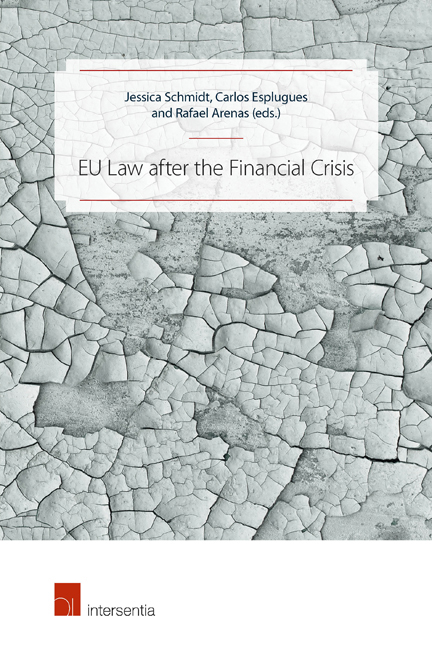Book contents
- Frontmatter
- Contents
- List of Abbreviations
- List of Authors
- Introduction
- PART I RESCUE MECHANISMS AND MONETARY POLICY
- PART II THE IMPACT OF THE FINANCIAL CRISIS ON THE BANKING SECTOR AND CAPITAL MARKETS
- PART III THE FINANCIAL CRISIS AND TAX LAW
- PART IV THE FINANCIAL CRISIS, CONSUMERS AND CONSUMER LAW
- Is European Private Law Going Through a Crisis? The Current Situation of European Private Law after the Financial Crisis
- Financial Crisis and General Contract Law
- Stress-Testing EU Law in the Field of Consumer Redress
- Stress Testing of European Law of Consumer Jurisdiction. Coherence of the Existing Rules and their Impact on the Level of Consumer Protection
- PART V THE FINANCIAL CRISIS AND COMPETITION LAW
- PART VI THE FINANCIAL CRISIS, RESTRUCTURING AND INSOLVENCY LAW
- PART VII THE SOCIAL DIMENSION OF THE FINANCIAL CRISIS AND EU CITIZENSHIP
- PART VIII REFLECTIONS ON THE IMPACT OF THE FINANCIAL CRISIS ON THE GENERAL EUROPEAN LEGAL FRAMEWORK AND THE FUNDAMENTAL “EUROPEAN IDEA”
Financial Crisis and General Contract Law
from PART IV - THE FINANCIAL CRISIS, CONSUMERS AND CONSUMER LAW
Published online by Cambridge University Press: 13 December 2017
- Frontmatter
- Contents
- List of Abbreviations
- List of Authors
- Introduction
- PART I RESCUE MECHANISMS AND MONETARY POLICY
- PART II THE IMPACT OF THE FINANCIAL CRISIS ON THE BANKING SECTOR AND CAPITAL MARKETS
- PART III THE FINANCIAL CRISIS AND TAX LAW
- PART IV THE FINANCIAL CRISIS, CONSUMERS AND CONSUMER LAW
- Is European Private Law Going Through a Crisis? The Current Situation of European Private Law after the Financial Crisis
- Financial Crisis and General Contract Law
- Stress-Testing EU Law in the Field of Consumer Redress
- Stress Testing of European Law of Consumer Jurisdiction. Coherence of the Existing Rules and their Impact on the Level of Consumer Protection
- PART V THE FINANCIAL CRISIS AND COMPETITION LAW
- PART VI THE FINANCIAL CRISIS, RESTRUCTURING AND INSOLVENCY LAW
- PART VII THE SOCIAL DIMENSION OF THE FINANCIAL CRISIS AND EU CITIZENSHIP
- PART VIII REFLECTIONS ON THE IMPACT OF THE FINANCIAL CRISIS ON THE GENERAL EUROPEAN LEGAL FRAMEWORK AND THE FUNDAMENTAL “EUROPEAN IDEA”
Summary
INTRODUCTION
This chapter points out changes to the EU after the financial crisis and takes a critical look at the developments and changes in the aftermath of the financial crisis. The financial crisis had a profound impact on the European economy.
The European Central Bank (ECB) established a new financial supervisory system, the so-called Single Supervisory Mechanism (SSM), which affects general contract law in Europe. In addition, the European Union developed a number of directives to set rules on general contract law across the EU.
The lack of consumer protection in the recent financial crisis showed that there is a particular need to promote consumer protection in financial services throughout the EU Member States, which has also fuelled major changes in EU contract law.
FINANCIAL CRISIS
The lack of consumer protection in the US was one of the main reasons for the financial crisis starting in 2007. The over-supply of mortgage loans that resulted in subprime lending was a root of the financial crisis. Unlucky consumers were exploited and defrauded by predatory lenders. Especially in the US, there are numerous banking supervisory authorities who supervise the financial market. They include the Federal Reserve, the Office of the Comptroller of the Currency, the Federal Deposit Insurance Corporation, the Securities and Exchange Commission and the National Credit Union Administration. Before the collapse of the mortgage market, no authority could or was willing to stop the build-up of the subprime bubble. Furthermore, no one could imagine that there were consumers who could not understand that the financial products offered would overstrain them.
The effects of the financial crisis were high unemployment, loss in value of houses and increasing indebtedness. Furthermore, the entire European economy was unstable. The financial markets were unsafe and unsound. Many European banks had to be rescued by the governments of the Member States. If one systemically important financial institution is about to go bankrupt, it is highly likely that other banks will get into trouble, too. One of the main problems in the last financial crisis was the loss of trust in the financial markets.
- Type
- Chapter
- Information
- EU Law after the Financial Crisis , pp. 117 - 132Publisher: IntersentiaPrint publication year: 2016
- 1
- Cited by



